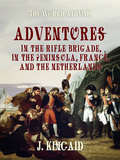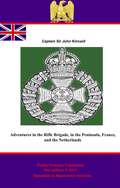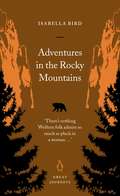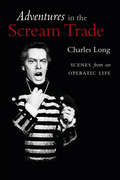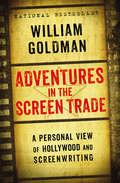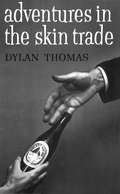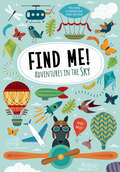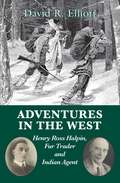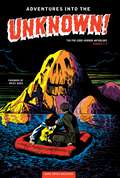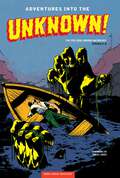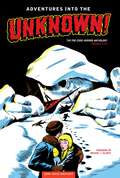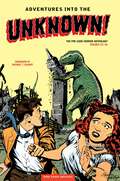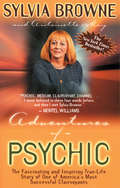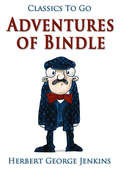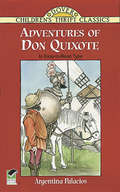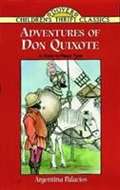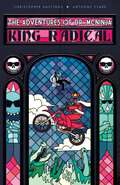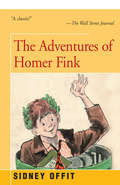- Table View
- List View
Adventures in the Rifle Brigade, in the Peninsula, France, and the Netherlands (The World At War)
by John KincaidThe memoirs of Capt. J. Kincaid covering his experiences in the famous Rifle Brigade. The Rifle Brigade (Prince Consort's Own) was an infantry rifle regiment of the British Army, formed in 1800 to provide sharpshooters, scouts and skirmishers. They later became part of the Royal Green Jackets. The brigade was distinguished by its use of green uniforms as standard in place of the traditional red, the first regular infantry corps in the British Army to do so.
Adventures in the Rifle Brigade, in the Peninsula, France, and the Netherlands from 1809 to 1815 [Illustrated and Annotated Edition]
by Pickle Partners Publishing Captain Sir John KincaidThis ebook is purpose built and is proof-read and re-type set from the original to provide an outstanding experience of reflowing text for an ebook reader. This edition contains over 60 annotations, illuminating the people and events recounted by Sir John, and also 6 maps illuminating the battles of Fuentes de Oñoro, Salamanca and Vittoria, also the sieges of Cuidad Rodrigo and Badajoz and the fortifications of Torres Vedras. Sir John Kincaid served with the 95th Rifles throughout the Peninsular War and the Waterloo campaign in 1815. Written with verve and wit and an eye for an amusing story, Adventures in the Rifle Brigade (as the 95th was known at the time), Kincaid provided an oft imitated pattern for British Rife memoirs. Published originally in 1830 the originality of the book has led to numerous re-editions since. The narrative includes; The Battles of Sabugal, Fuentes D'Oñoro, Salamanca, Vittoria, the Nivelle and Waterloo,and the sieges of Badajoz and Cuidad Rodrigo. The Text has been taken from the edition published by T. and W. Boone, 1830 London Author - Sir John Kincaid 1787-1862
Adventures in the Rocky Mountains (Great Journeys Ser.)
by Isabella BirdEndlessly restless and endlessly curious, Isabella Bird (1831-1904) travelled the world looking for new experiences, but never more delightfully than in her pony-bound adventures in the Colorado Territory at a time when it was only notionally under the control of the American authorities. A vanished world of grizzly hunters, cowboys, isolated cabins and plagues of rattlesnakes is here beautifully brought back to life.Great Journeys allows readers to travel both around the planet and back through the centuries – but also back into ideas and worlds frightening, ruthless and cruel in different ways from our own. Few reading experiences can begin to match that of engaging with writers who saw astounding things: Great civilisations, walls of ice, violent and implacable jungles, deserts and mountains, multitudes of birds and flowers new to science. Reading these books is to see the world afresh, to rediscover a time when many cultures were quite strange to each other, where legends and stories were treated as facts and in which so much was still to be discovered.
Adventures in the Scream Trade: Scenes from an Operatic Life
by Charles LongCharles Long thrilled opera audiences for more than two decades, performing on some of America's and the world's most famous stages and singing alongside some of the medium's greatest stars. Now retired, Long vividly recounts many of those experiences in this insightful, frank, and humorous memoir. Sparing no one, especially himself, from his acerbic wit and keen observations, he sheds a bright light into a world many of us respect and admire but few of us have ever encountered in such intimate detail. In the process he illustrates why the word opera, which means work in Italian, truly is a labor of love for so many who have given their all to their art.
Adventures in the Screen Trade
by William GoldmanNow available as an ebook for the first time!No one knows the writer's Hollywood more intimately than William Goldman. Two-time Academy Award-winning screenwriter and the bestselling author of Marathon Man, Tinsel, Boys and Girls Together, and other novels, Goldman now takes you into Hollywood's inner sanctums...on and behind the scenes for Butch Cassidy and the Sundance Kid, All the President's Men, and other films...into the plush offices of Hollywood producers...into the working lives of acting greats such as Redford, Olivier, Newman, and Hoffman...and into his own professional experiences and creative thought processes in the crafting of screenplays. You get a firsthand look at why and how films get made and what elements make a good screenplay. Says columnist Liz Smith, "You'll be fascinated.
Adventures in the Skin Trade
by Dylan ThomasA story collection full of a fantastic and whimsical assortment of odd characters only Dylan Thomas could have conceived. This collection of the poet Dylan Thomas's fiction--and what an extraordinary storyteller he was!--holds special interest because it ranges from the early stories such as "The School for Witches" and "The Burning Baby," with their powerful inheritance of Welsh mythology and wild imagination, to the chapters he completed before his death of the alas unfinished novel Adventures in the Skin Trade. Adventures is the story, written in a shrewd, sly, deadpan vein of picaresque comedy, of young Samuel Bennet, who runs away from his home in Wales to seek his fortune in London.
Adventures in the Skin Trade and Other Stories
by Dylan Thomas21 short stories by Dylan Thomas, one of the major figures of 20th century literature.
Adventures in the Sky (Find Me!)
by Agnese BaruzziHave a howling good time with Bernard the Wolf as he takes to the skies—and space—with this delightful collection of seek-and-find puzzles. Bernard the Wolf is back in another thrilling seek-and-find adventure! This time, he&’s flying high up in the sky with the help of his new friend, Enrico the Robin, who&’s teaching him how to sharpen his vision. Filled with charming visual puzzles that take place in outer space, among colorful hot air balloons, inside a flock of flamingos, and more, children will have tons of fun while they develop their observation skills and practice drawing conclusions based on what they see with more than a hundred hidden object games! From determining which bird is pretending to be a wizard and which alien has a cold to what seems out of place and who is the lazy acrobat, Find Me! Adventures in the Sky is sure to entertain for hours on end! &“Find Me! seek-and-find books are a brilliant way to encourage critical thinking skills for your little one.&” —First Time Parent Magazine This is a fixed-format ebook, which preserves the design and layout of the original print book
Adventures in the South, Volume 4: Depart Switzerland
by Jacques CasanovaThis book is the number 4 of the "Adventures in the South"
Adventures in the South, Volume 4e: Milan
by Jacques CasanovaAdventures in the South, book 4e "Milan"
Adventures in the West: Henry Halpin, Fur Trader and Indian Agent
by David R. ElliottThis is the story of Irish-born Henry Ross Halpin, who by the age of 16 began a long association with the fur trade and Canada’s native peoples, was thrice employed by the Hudson’s Bay Company, and became an Indian agent (18851901). Halpin’s work took him from Fort Garry, Manitoba, to Fort York on the shores of the Hudson Bay, and across the Prairies to British Columbia. This book is based on Halpin’s previously unpublished menoirs, Hudson’s Bay Company post journals and correspondence, the 1885 Rebellion trials where Halpin was a witness, and the reports and correspondence of the Department of Indian Affairs.
Adventures into the Unknown Archives Volume 1
by VariousThe first ongoing horror comics anthology, Adventures into the Unknown! is finally collected into a series of deluxe hardcovers! The pre-Code delights found in this debut volume include inventive, exciting tales like "The Living Ghost," "Kill, Puppets, Kill," "The Affair of Room 1313," and the ongoing "True Ghosts of History" feature—and contributions from Golden Age greats Fred Guardineer, Al Feldstein, Leonard Starr, Edvard Moritz, and others! Adventures into the Unknown! Archives Volume 1 reprints the first four issues of the popular, long-running horror anthology, which ran from 1948 to 1967.* Foreword by Bruce Jones!
Adventures into the Unknown Archives Volume 2
by VariousCursed phantoms and enraged apparitions haunt the pages ofAdventures into the Unknown!—the first ongoing comics anthology of supernatural horror! Dark Horse&’s deluxe hardcover collects issues #5-#8 of this strange series. Featuring Golden Age talents like Jon L. Blummer, Tarzan newspaper strip illustrators Bob Lubbers and John Celardo, and horror legend Johnny Craig.* Foreword by horror writer Bruce Jones!
Adventures into the Unknown Archives Volume 3
by VariousFrom storm-battered castles to secret laboratories, the golden age supernatural anthology Adventures into the Unknown! had every spooky setting audiences could desire! Eminent illustrators Ogden Whitney, Bob Lubbers, John Celardo, Lin Streeter, and others deliver some classic pre-Code horror stories. Collecting issues #9-#12, this deluxe hardcover also includes an introductory essay by Michael T. Gilbert.* The rare and expensive comics are finally collected!* Featuring classic work by Ogden Whitney!
Adventures into the Unknown Archives Volume 4
by VariousFrom storm-battered castles to secret laboratories to the oceans' depths, the golden age supernatural anthology comic Adventures Into the Unknown had every spooky setting audiences could desire and Dark Horse is collecting them all into deluxe hardcover archive editions! A classic cover by Ogden Whitney sets the tone for our fourth excursion into the quirky realms found in Adventures into the Unknown! Enjoy "Beware the Jabberwock," "The Ghost that Didn't Die," and an excellent cover run by Whitney--as well as a plethora twisted tales! Classic monsters, convoluted crises, and ghosts of all sorts populate these entertaining stories from the early 1950s, with contributors including Fred Guardineer, Lin Streeter, Charles Sultan, and others. This volume features a new foreword by comic-book historian and Mr. Monster creator Michael T. Gilbert, as well as all original text pieces and letter columns!
Adventures of A Psychic: The Fascinating And Inspiring True-life Story Of One Of America's Most Successful Clairvoyants (Signet Ser.)
by Sylvia Browne Antoinette MayIn this uniquely fascinating book, world-renowned psychic Sylvia Browne recounts her captivating life as a clairvoyant, telling of her earliest "readings" as a young child in Kansas City, and of her first contact with "Francine," her spirit guide. In engrossing detail, Sylvia tells how her "gift" has assisted police departments in their search for missing children and dangerous criminals—and how her predictions of deaths, plane crashes, and momentous world events were sometimes heeded—or tragically ignored. But more than anything else, this is the remarkable story of one woman’s psychic odyssey, for it offers illuminating insight into how we can better understand ourselves and our own psychic abilities. ADVENTURES OF A PSYCHIC may give you an entirely new outlook on life, death, psychic phenomena, and the "other side!"
Adventures of Bindle: Revised Edition Of Original Version (Classics To Go)
by Herbert George JenkinsHerbert George Jenkins (1876 – 8 June 1923) was a British writer and the owner of the publishing company Herbert Jenkins Ltd. which published many of P. G. Wodehouse's novels. As was the norm at the time, many of his fictional works appeared first in pulp magazines. Two of his novels and several of his short stories were made into short movies. (Excerpt from Wikipedia)
Adventures of Don Quixote (Amplify Core Knowledge Language Arts Activity Book)
by Amplify LearningUnit 4 is centered around an adapted version of Don Quixote paired with Miguel de Cervantes's Adventures of Don Quixote.
Adventures of Don Quixote (Dover Children's Thrift Classics)
by Argentina Palacios"Once, there was a man who went crazy from too much reading. He only read books about knighthood; that was the problem." So begins this charming retelling of Don Quixote de la Mancha, one of the most entertaining books ever written. Young people will delight in the hilarious adventures of the idealistic would-be knight and his "squire," Sancho Panza, as they set out to right the wrongs of the world. Ms. Palacios, a talented storyteller, captures all the flavor and irony of the original as the two heroes ride forth to conquer evil. Along the way the well-meaning but addled knight-errand mistakes a miserable inn and its keeper for a castle and its lord; imagines an ordinary peasant girl to be the noble lady Dulcinea, perceives windmills as giants to be overcome, and gets enmeshed in other cases of mistaken identity. These, and many more incidents and adventures are retold here in a beguiling, easy-to-read version, enhanced by six new black-and-white illustrations by Thea Kliros. This edition is sure to delight today's youngsters, just as the original has enchanted countless readers since its publication nearly 400 years ago.
Adventures of Don Quixote: Activity Book (Amplify Core Knowledge Language Arts, Grade 5 #Unit 4)
by Amplify EducationNIMAC-sourced textbook
Adventures of Don Quixote: New Edition, With Engravings From Designs By Richard Westall, Volume 2
by Miguel de Cervantes Saavedra Argentina PalaciosNIMAC-sourced textbook
Adventures of Don Quixote: Translated From The Spanish (classic Reprint) (Dover Children's Thrift Classics Ser.)
by Miguel de Cervantes Saavedra Argentina Palacios"Once, there was a man who went crazy from too much reading. He only read books about knighthood; that was the problem." <P><P>So begins this charming retelling of Don Quixote de la Mancha, one of the most entertaining books ever written. Young people will delight in the hilarious adventures of the idealistic would-be knight and his "squire," Sancho Panza, as they set out to right the wrongs of the world. <P><P>Ms. Palacios, a talented storyteller, captures all the flavor and irony of the original as the two heroes ride forth to conquer evil. Along the way the well-meaning but addled knight-errand mistakes a miserable inn and its keeper for a castle and its lord; imagines an ordinary peasant girl to be the noble lady Dulcinea, perceives windmills as giants to be overcome, and gets enmeshed in other cases of mistaken identity. These, and many more incidents and adventures are retold here in a beguiling, easy-to-read version, enhanced by six new black-and-white illustrations by Thea Kliros. <P><P>This edition is sure to delight today's youngsters, just as the original has enchanted countless readers since its publication nearly 400 years ago.
Adventures of Dr. McNinja, The: King Radical
by Christopher HastingsWhen everyone thinks Dr. McNinja is killed by a vengeful astronaut ghost, it's his chance to infiltrate the criminal organization of King Radical. But should he who fights rad monsters beware of becoming one himself?
Adventures of Homer Fink
by Paul Galdone Sidney OffitHomer Fink could speak Latin and Greek or chart the orbit of the planet Jupiter, but when it came to tying his shoelaces or knotting his tie Homer was helpless. The Adventures of Homer Fink is a story of youth's first awareness of power and philosophy and love. It is peopled with characters as real as your next-door neighbors and yet uniquely extraordinary. Above all, this is a tale full of humor and affection and the wonder of growing up.
